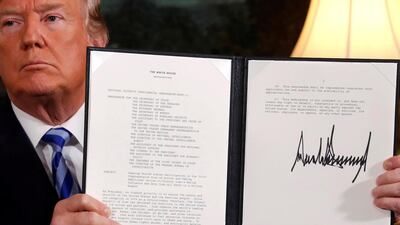When President Donald Trump announced that the US would withdraw from the Iran nuclear deal he was making good on a central campaign promise and rolling up another part of Barack Obama’s legacy, exciting supporters and angering opponents in equal measure.
Michael Johns, a Tea Party founder and Trump backer, said: “The president was elected on some very clearly and pronounced promises to the American people in the area of foreign affairs – and in the area of foreign affairs there may have been none more prominent than the fact he was going to terminate the Iran deal, that he properly labelled the ‘worst deal ever negotiated’ in American diplomatic history.”
But Democrats sensed a motive rooted in petty partisan politics.
“Everything President Obama has done, this president wants to undo,” said Dianne Feinstein, a Democratic senator, on Twitter.
The work to reverse cornerstone achievements of President Obama’s time in office began as soon as his successor reached the White House.
On his first Monday in office, President Trump signed an executive order to withdraw the US from the Trans-Pacific Partnership, another campaign promise based on his America First policy and philosophy of economic nationalism. The partnership with 11 Pacific Rim nations had been negotiated by his predecessor to reduce tariffs and foster trade to boost growth.
“We’re going to stop the ridiculous trade deals that have taken everybody out of our country and taken companies out of our country, and it’s going to be reversed,” said Mr Trump.
The move was well signposted and, as a result, the deal had never been ratified by Congress.
______________
Read more
Iran nuclear deal: Trump pulls out US from landmark agreement
Iran: Trump doesn't have 'mental capacity' to deal with issues
France, Germany and UK to meet Iran on nuclear deal
______________
In June last year, however, Mr Trump shocked the world by announcing the US was redrawing from the Paris climate accord, a set of agreements providing a global framework for tackling global warming by phasing out fossil fuels and introducing clean energy measures.
The move was preceded by frantic diplomatic manoeuvring but supporters pointed to a campaign commitment and another promise kept.
“We’re going to cancel the Paris climate agreement and stop all payments of US tax dollars to UN global warming programmes,” Mr Trump had said in a rare scripted speech delivered in Dakota.
Throughout his administration, he has also steadily been using executive orders to reverse Mr Obama’s domestic policies, from environmental regulations such as his Clean Power Plan to the amnesty for undocumented immigrants who arrived as children.
Another key campaign promise was the repeal and replacement of the Affordable Care Act. If the Iran deal was the keystone of Mr Obama’s foreign policy legacy, then the Obamacare was hailed as his top domestic achievement.
Although Republicans failed to introduce what became nicknamed “Trumpcare”, they did succeed in abolishing the “individual mandate”, which compelled Americans to buy health insurance.
“We repealed the core of disastrous Obamacare—the individual mandate is now gone,” is how Mr Trump trumpeted the achievement during his State of the Union address in January.
Mr Johns insisted the measures were not motivated by partisan politics but by promises to the American electorate.
He said: “It will be difficult to look back in 20 years from now and conclude that Obama was a transformational president.”

